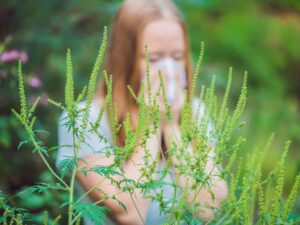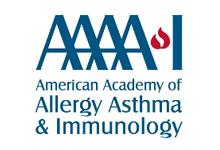Fall allergy season is underway for many parts of the  U.S. Here in Texas, the fall season typically begins in late August/early September and ends in December. For those who have allergies, it can be a dreadful time of year.
U.S. Here in Texas, the fall season typically begins in late August/early September and ends in December. For those who have allergies, it can be a dreadful time of year.
If you are allergic, your immune system recognizes the allergen as a foreign substance and tries to fight against it. As it does this, histamine and other chemicals are released in large quantities causing the typical symptoms you experience when you are allergic. Constant sneezing, congestion, watery itchy eyes, nose, throat, and asthma flare-ups can all be a sign of allergies.
What can cause these symptoms?
Weeds/Ragweed
According to the CDC, the biggest culprit for fall allergy is ragweed pollen. In fact, the DFW area has consistently been ranked one of the worst areas for ragweed allergies. A single ragweed plant can produce a billion pollen grains. These grains are very light weight and float easily through the air and can be dispersed as far as 400 miles away. With the Texas heat and increased carbon dioxide levels, the ragweed plant will have a longer growth time. Unfortunately, this allows for a longer ragweed season. Peak season is typically in mid-September.
There are many species of ragweed, but most allergy symptoms are caused by Giant Ragweed and Short Ragweed.
Other weeds that can also cause allergic symptoms in the fall, include Marsh elder, Pigweed, Sagebrush, Lamb’s Quarter, English Plantain, and Mugwort pollen. These types of weeds are also found here in Texas.
Mold
Mold can be a trigger as well. When humidity is high or even on dry/windy days, mold spores are released into the air and can trigger symptoms for those who are allergic. Indoor allergens can also be a trigger. Mold allergy symptoms can be year-round, but it typically peaks around late summer/early fall in Texas.
Dust mite and pet dander
As schools are in session, children are spending more time indoors and those allergic to dust mite and/or pet dander may experience worsening symptoms during this time of year.
Is it allergies or is it a cold?
Getting a cold could mimic allergy symptoms making it hard to differentiate between allergies and an infection. As schools are opening, the risk for viral infections also increases.
The biggest difference between allergies and a cold is that infections can present with fever and are contagious while allergies are not.
What can you do?
The first step is to come see us at North Texas Allergy and Asthma Center for a proper evaluation and testing to help determine your allergy triggers. We can test for many things, including indoor and outdoor allergens.
Once you have identified your allergy triggers, avoidance measures can be taken.
- Limiting exposure to pet dander and/or dust mite as best you can and avoiding outdoor activities on high pollen count days can be helpful.
- After spending time outdoors, showering, changing, and washing your clothes can help reduce your allergen exposure.
- If working outdoors, wearing a NIOSH N95-rated filter mask can help filter out pollen.
- Keeping your windows in the car and home closed can help as well. Wearing sunglasses can help protect your eyes from the pollen.
Medications are helpful in controlling the symptoms and they include a variety of over the counter and prescription antihistamines, nasal sprays, decongestants, and expectorants. It is important to start treating your allergy symptoms early, preferably before the season starts.
Immunotherapy is a long-term treatment option in which a patient receives increasing doses of their allergens. Over time, the body becomes immune to the allergens providing lasting relief of allergy symptoms for years to come even after treatment has stopped.
Make an appointment with us
At North Texas Allergy and Asthma Center, we offer traditional allergy injections, sublingual immunotherapy drops, and tablets for house dust mite, ragweed, and certain grasses.
If you suffer during the fall season, you could be allergic! Come see one of our experienced board-certified allergists for evaluation, testing, and treatment options. We can help you feel better!
SHIKHA MANE, MD
Board Certified Allergist







